Covid: NHS Wales under 'substantial pressure' amid backlog
- Published
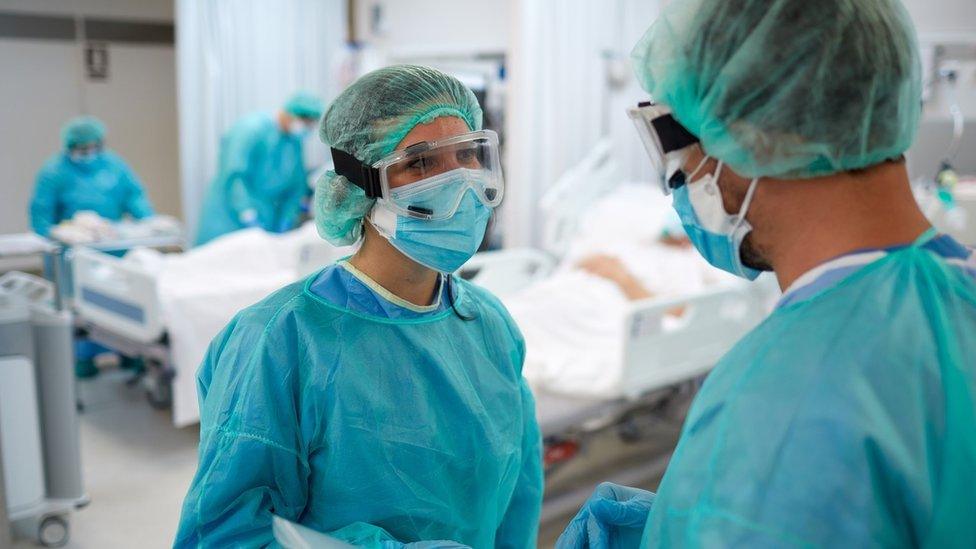
NHS Wales waiting times are due to be published amid a growing backlog of patients
The Welsh NHS is under "substantial pressure" as services return to pre-pandemic levels, its chief executive has warned.
Dr Andrew Goodall said the need to continue with Covid-19 precautions meant a "difficult combination" of factors was straining the system.
Monthly waiting times show another rise, amid a growing backlog of patients waiting for treatment.
One doctors' group has called for a radical reorganisation of services.
Data from April showed there were 595,272 people on waiting lists in Wales - this has risen again on March and is up 29% on pre-pandemic levels.
Health Minister Eluned Morgan said it was a "massive uphill task" to clear the backlog and did not rule out establishing regional hubs.
"We've made it very clear it probably will take the whole length of this Senedd term [five years] to get us back to pre pandemic levels," she told BBC Radio Wales.
"We had to pause non-emergency care, that has created a massive challenge for us, but we've already put £100m on the table to get our health boards to shift some of that [backlog]."


How many people are waiting?
We can see in April, 223,365 people were waiting more than 36 weeks or nine months for hospital treatment.
When we look at specialist areas, in trauma and orthopaedics there were 52,822 people waiting more than nine months. This is a 527% increase on the pre-pandemic total in February 2020.
Altogether, there are 87,918 orthopaedic and trauma patients waiting for treatment.
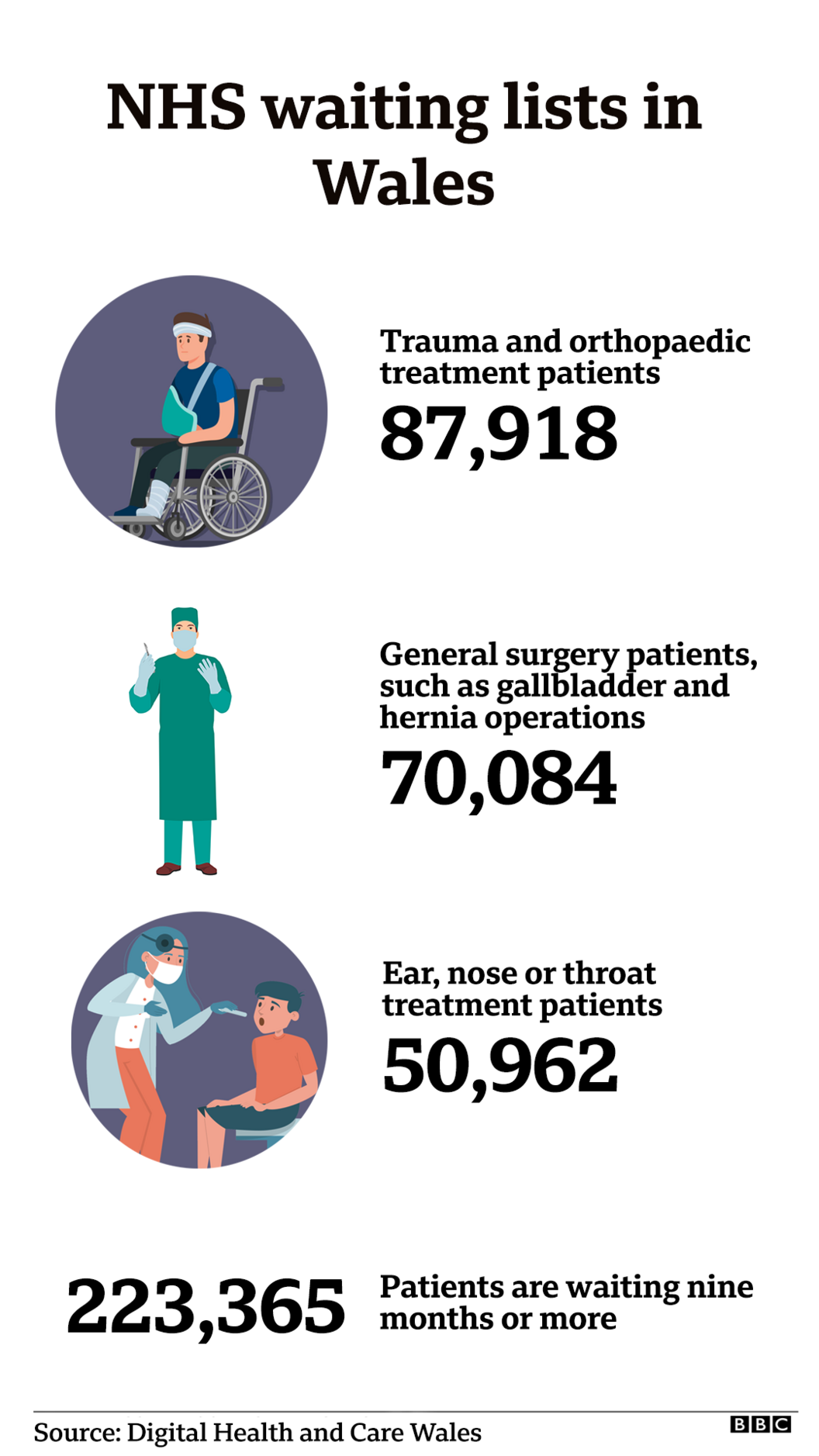

Those waiting the longest for general surgery have also hit a new high - 26,943, 12 times the numbers waiting before the pandemic.
In February 2020, 252 people had been waiting more than nine months for cardiology treatment, and by April this year there were 4,159 people with long waits. The number on that list has risen slightly after falling for four successive months.
Numbers waiting the longest for cardiothoracic surgery are still falling although there are still 136 patients - three times the numbers before the pandemic hit.
While two people were waiting more than nine months before the pandemic in February 2020 for restorative dental work, that has now increased to 625, although has fallen for the fifth successive month
For neurology treatments, numbers rose from 22 to 906 from pre-pandemic to April.

Cancer charity Tenovus said 13,480 people in Wales were referred to the Suspected Cancer Pathway April - the second consecutive time the monthly figure has exceeded the pre-pandemic average monthly figure of 13,208.
"This is a chink of light that gives us optimism that, as the Covid-19 pandemic begins to subside, we can avert a cancer pandemic through a combination of public awareness-raising and investment in our health service," said chief executive Judi Rhys.
A&E demand back to 'normal'
Attendances at emergency departments have also returned to pre-pandemic levels, and NHS Wales said that one health board experienced its busiest-ever day for A&E attendances on Monday.
In May, there were more than 81,000 A&E attendances, nearly 5,000 more than in February 2020.
The NHS Wales chief executive added that planned treatments were now at 70% of normal levels.
Dr Goodall said: "It is a substantial pressure, I think it is substantial for different reasons. NHS staff want to make sure that we are able to support our patients across Wales and make sure that they can be seen within the appropriate and right level of services.
"But they are having to balance a growth in emergency pressures back to normal levels.
"They are still having to protect both staff and patients working around them. And they are the same staff who have been there through the pandemic, who are having to focus on the new services, to make sure people are supported as well."
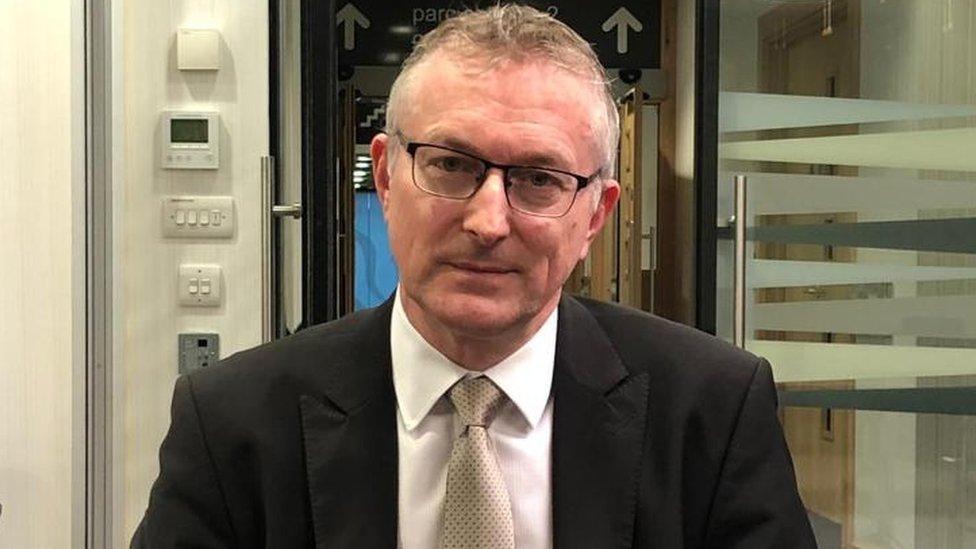
Dr Andrew Goodall says Covid precautions mean a "difficult combination" of factors are straining the system
Health boards asked to 'innovate'
Health boards have been asked to come up with innovative ways of dealing with the backlog, and an initial £100m of new funding has been made available by the Welsh government to try to bring waiting lists down.
Pilot schemes have begun in some areas to reduce waiting times or improve the quality of life for those who will continue to face the longest delays in their treatment.
Surgical teams at the Princess of Wales hospital in Bridgend have already seen a significant reduction in waiting times for patients referred for urgent treatment after visiting A&E or their GP.
The Ambulatory Emergency Surgical Unit was launched at the hospital before the pandemic to allow patients to be assessed, diagnosed and treated - often on the same day. They do not need to be seen by separate medical teams or admitted as an inpatient.
The model was so efficient it has since been expanded to emergency medical admissions, and will be implemented for emergency gynaecology admissions from 1 July.
Consultant surgeon Simon Weaver said the system had allowed about 80% of patients to be seen and treated within three hours, compared with about 30% before it was introduced.
"When it comes to resetting services it's really important that we're a getting a bang for our buck," he said.
"We've got to take this as an opportunity to restart the NHS."
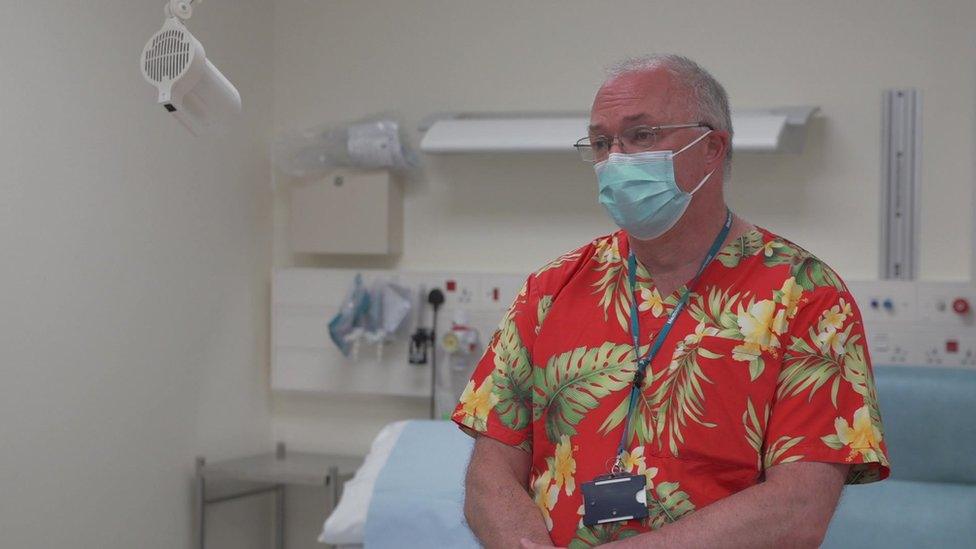
The Ambulatory Emergency Surgical Unit has slashed treatment times, consultant surgeon Simon Weaver says
'Regional solutions'
While local innovations will help reduce some pressures, the Royal College of Surgeons (RCS) has called for the creation of non-Covid hubs to tackle waiting lists.
Richard Johnson, the director of RCS in Wales, said: "There is now an urgency to develop these sites and have a radical rethink of how the NHS is working in Wales.
"We are looking at these sites for planned treatments. We are not talking about new sites, we are talking about a reorganisation of the sites we have in Wales already."
Mr Johnson said an RCS survey found patients were prepared to travel in order to be treated at new hubs across Wales.
And he said there needed to be "an open and honest discussion" about the implications of not changing the way hospitals are currently organised.
Dr Goodall said many changes had been implanted already, including greater use of technology in connecting patients to clinicians.
He added it was "inevitable that we're going to have to have more regional solutions, with health boards working alongside each other to achieve that".
"And I know there's a lot of clinical support for that to happen in Wales."
The health minister said the Welsh government was currently looking at ways to fund such hubs.
'Exhausted staff'
Darren Hughes, director of the Welsh NHS Confederation, said there was a "long road ahead" for the NHS in Wales to recover from the pandemic.
He urged the public to continue using services responsibly, adding: "It's the same exhausted staff who have worked tirelessly over the last 15 months that will be required to deliver services and ultimately help tackle waiting lists.
"We can't thank them enough for all they've done for the people of Wales, and we must remember that as we begin the next chapter of recovery, they too need to recover."
Delta variant cases 'increasing'
Cases of the Delta variant of the virus, first identified in India, remain comparatively low in Wales compared with England.
Dr Goodall said the next two to four weeks would be crucial in determining whether a further increase in cases in Wales would result in a spike in hospital admissions.
Ros Atkins on: What are the Delta variant symptoms?
He said: "Numbers associated with a Delta variant remain very low in Wales from a hospital perspective, although they're increasing in terms of community cases. So we're tracking it very carefully.
"But inevitably there will be some impact in Wales and it's why, in part, I know that the first minister and the cabinet made decisions to defer some arrangements earlier on during this month, because it was to try and allow for more vaccination coverage for the population, which will provide a higher level of protection."
- Published22 April 2021
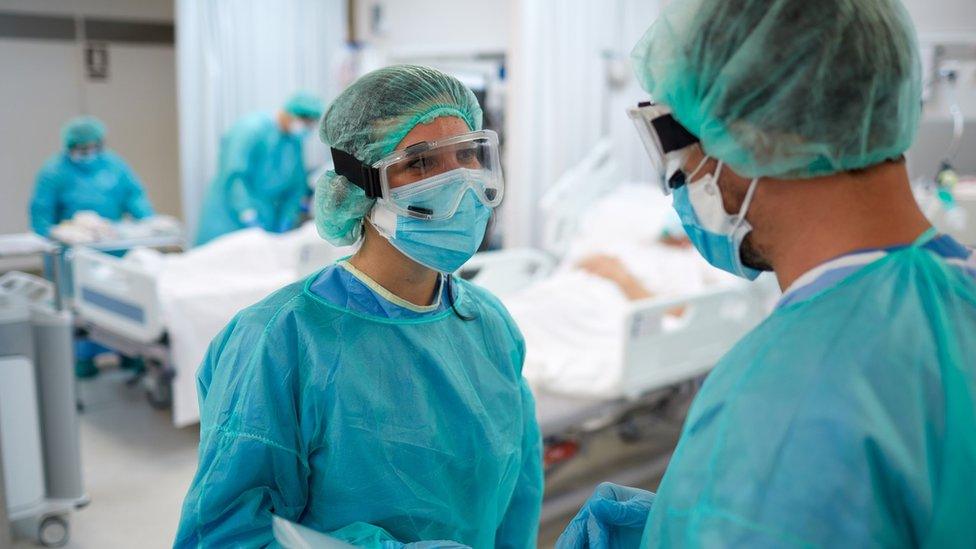
- Published18 March 2021
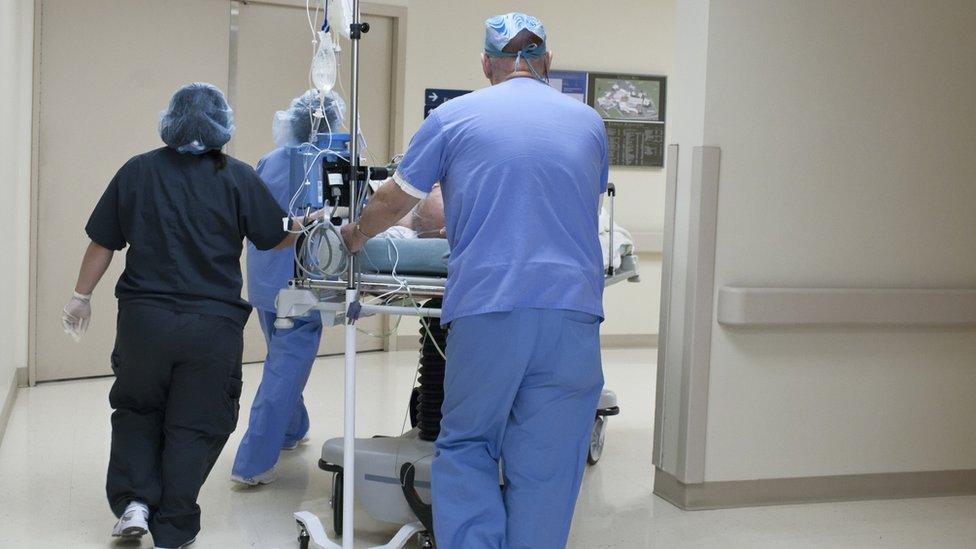
- Published22 March 2021

- Published21 January 2021
